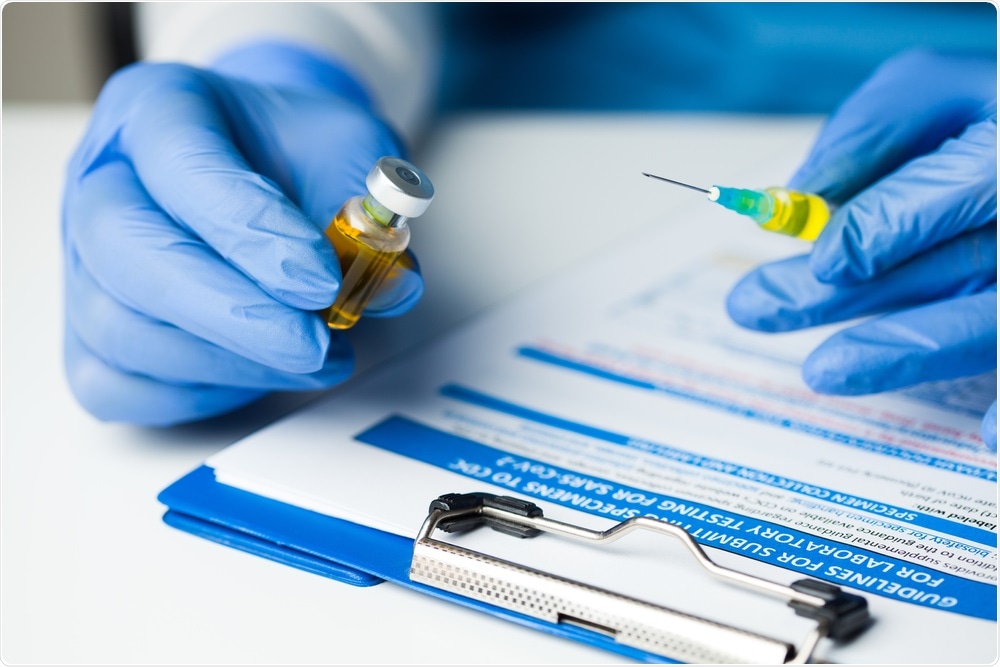Analysis of immunodeficient patients granted REGEN-COV under compassionate use COVID-19 program

Patients with primary or secondary immunodeficiency-associated antibody disorders cannot produce antibodies against infective agents. Thus, these individuals are often at a higher risk of prolonged or persistent coronavirus disease 2019 (COVID-19), with a high risk of morbidity and mortality.
A team of scientists from Regeneron Pharmaceuticals, Inc. recently conducted a retrospective study to describe the safety and response to casirivimab and imdevimab (REGEN-COV®) under emergency compassionate use for patients with primary and/or secondary immunodeficiency-associated antibody disorders. This study, which is published on the preprint server medRxiv*, particularly looks at patients who had the disease for 21 or more days before the treatment.
 Study: Compassionate Use of REGEN-COV® in Patients with COVID-19 and Immunodeficiency-Associated Antibody Disorders. Image Credit: Cryptographer / Shutterstock.com
Study: Compassionate Use of REGEN-COV® in Patients with COVID-19 and Immunodeficiency-Associated Antibody Disorders. Image Credit: Cryptographer / Shutterstock.com
REGEN-COV®
The severe acute respiratory syndrome coronavirus 2(SARS-CoV-2) binds the host cell angiotensin-converting enzyme 2 (ACE2) receptor through the receptor-binding domain (RBD) of the spike protein. This binding is imperative for viral infection.
Casirivimab and imdevimab (REGEN-COV®) is a combination of two human immunoglobulin G1 monoclonal antibodies (mAbs) that bind to the SARS-CoV-2 RBD and block the interaction of SARS-CoV-2 with ACE2.
REGEN-COV® targets separate regions of the RBD and neutralizes SARS-CoV-2. Due to two different targets, the chances of viral escape as a result of genetic mutations are reduced. Thus, the casirivimab and imdevimab combination retains neutralization potency against multiple SARS-CoV-2 variants.
The neutralizing activity of REGEN-COV® is estimated to be several thousands of times higher than convalescent plasma. Several clinical studies have shown its efficacy in prophylaxis and in the treatment of both outpatients and hospitalized patients. In these studies, REGEN-COV® was particularly beneficial for seronegative patients who did not produce anti-SARS-CoV-2 antibodies. The seronegative patients may be similar to individuals with immunodeficiency who cannot mount an antibody response.
A retrospective analysis
Recently, the United States Food and Drug Administration (FDA) has granted compassionate use of REGEN-COV® for patients with COVID-19 and primary and/or secondary immune deficiencies. Compassionate use refers to the use of drugs still in clinical development.
In the current study, the scientists gathered data from patients who received REGEN-COV® under emergency compassionate use from September 2, 2020, to March 29, 2021.
Patients were eligible for REGEN-COV® compassionate use if they had a serious, life-threatening disease, had sufficient evidence of higher benefit than risk, were not eligible for any clinical trial, and had no viable or available treatment options. Patients were required to have a positive SARS-CoV-2 reverse transcription-polymerase chain reaction (RT-PCR) within approximately one week of treatment to be eligible for compassionate use.
The retrospective analysis would provide a better understanding of clinical outcomes in this vulnerable group. The scientists have focused on a subset of patients with a COVID-19 duration of 21 or more days before treatment, as this subset reflects those unable to effectively clear the virus.
Outcome measures included change in oxygenation status, viral load, and physician-reported clinical status. The scientists also evaluated serious adverse events and death.
Study outcomes
In total, 174 patients were approved to receive REGENCOV® under the emergency compassionate use program as of March 29, 2021. Of these individuals, 95 (54.6%) had primary and/or secondary immunodeficiency-associated antibody disorders, and 85 received intravenous REGEN-COV®.
Data were available for 64 patients who received REGEN-COV®. Of the 64 patients, 90.6% showed an improvement in one or more outcome measures. Thirty-seven of these patients had a COVID-19 duration of 21 or more days before treatment.
The median time from confirmed RT-PCR diagnosis to REGEN-COV® administration was 60.5 days. Of the 29 patients with COVID-19 duration of 21 or more days before treatment who had available outcome data, 96.6% showed improvement in one or more outcome measures.
Fourteen patients had post-treatment RT-PCR results available. A total of 11 (78.6%) reported a negative RT-PCR following treatment with REGEN-COV®, with five patients (45.5%) within five days of treatment and eight (72.7%) within 21 days of treatment.
In the overall patient group, 10 out of 85 patients (11.8%) experienced serious adverse events. Two deaths were reported, one from hypoxia and one from respiratory failure. Neither death was attributed to treatment with REGEN-COV® and these events reported were consistent with COVID-19 complications.
Conclusions
In the current study, REGEN-COV® treatment led to rapid viral clearance and clinical improvement in the immunodeficient patients with long-standing COVID-19. The findings of this study corroborate with the data from Phase II and III studies of REGEN-COV®.
These findings support the broader use of REGEN-COV® for the treatment and prevention of COVID-19 in the immunocompromised patient population.
*Important notice
medRxiv publishes preliminary scientific reports that are not peer-reviewed and, therefore, should not be regarded as conclusive, guide clinical practice/health-related behavior, or treated as established information.
- Stein, D., Oviedo-Orta, E., Kampman, W. A., et al. (2021). Compassionate Use of REGEN-COV® in Patients with COVID-19 and Immunodeficiency-Associated Antibody Disorders. medRxiv. doi:10.1101/2021.11.05.21265911. https://www.medrxiv.org/content/10.1101/2021.11.05.21265911v1
Posted in: Drug Trial News | Medical Research News | Disease/Infection News | Healthcare News | Pharmaceutical News
Tags: ACE2, Angiotensin, Angiotensin-Converting Enzyme 2, Antibodies, Antibody, Cell, Clinical Trial, Convalescent Plasma, Coronavirus, Coronavirus Disease COVID-19, Drugs, Efficacy, Enzyme, Food, Genetic, Hypoxia, Immunodeficiency, Immunoglobulin, Mortality, Pharmaceuticals, Polymerase, Polymerase Chain Reaction, Prophylaxis, Protein, Receptor, Respiratory, SARS, SARS-CoV-2, Severe Acute Respiratory, Severe Acute Respiratory Syndrome, Spike Protein, Syndrome, Therapeutics, Transcription, Virus

Written by
Dr. Shital Sarah Ahaley
Dr. Shital Sarah Ahaley is a medical writer. She completed her Bachelor's and Master's degree in Microbiology at the University of Pune. She then completed her Ph.D. at the Indian Institute of Science, Bengaluru where she studied muscle development and muscle diseases. After her Ph.D., she worked at the Indian Institute of Science, Education, and Research, Pune as a post-doctoral fellow. She then acquired and executed an independent grant from the DBT-Wellcome Trust India Alliance as an Early Career Fellow. Her work focused on RNA binding proteins and Hedgehog signaling.
Source: Read Full Article




